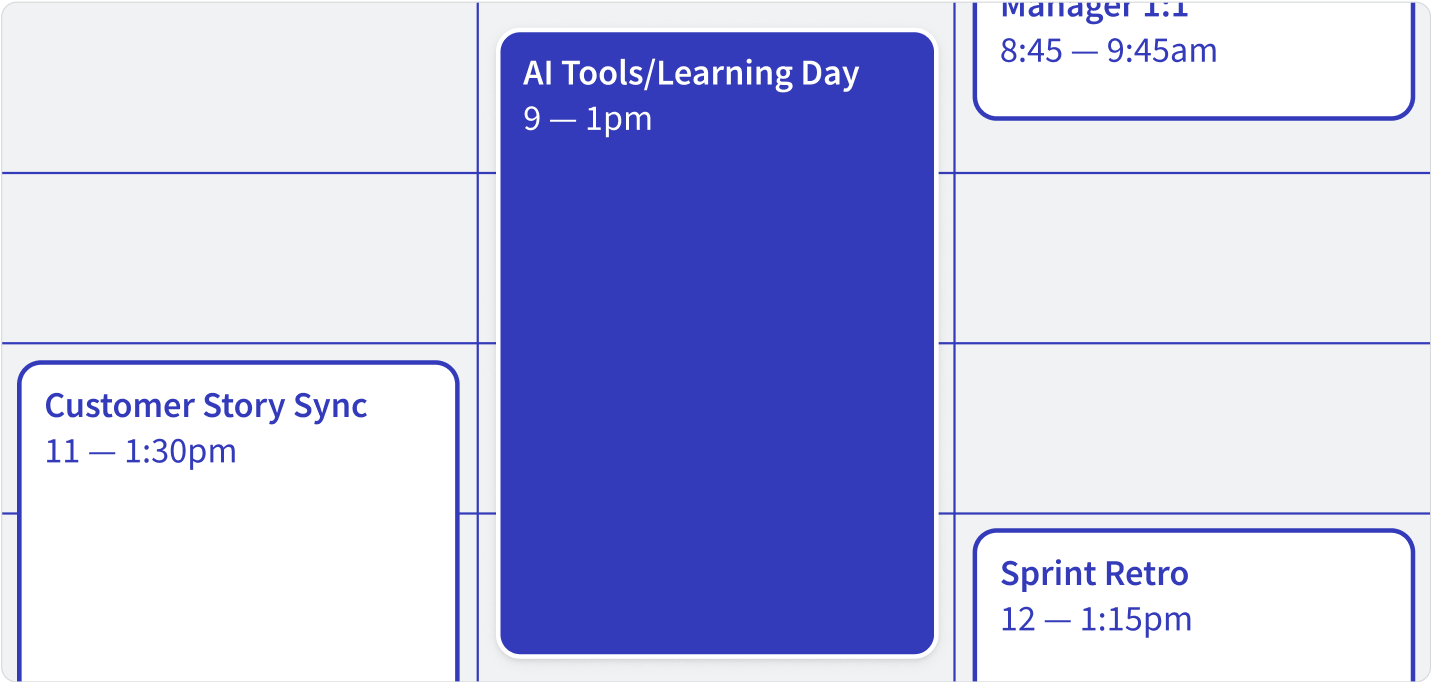Empowering your teams
The importance of a knowledge community
For AI coding tools to add value to your work, they have to fit into your teams’ existing workflows.
As ever, new tools and technologies demand new skill sets and inspire fresh ways of solving old problems. Top of mind today is what it will take to upskill your teams to take maximum advantage of AI to maintain productivity in an accelerating industry.
When learning is an integral part of your organizational culture, your teams are primed to leverage and implement new AI tools. Much of the public conversation around this tech centers on job loss, but this perspective is worth reframing. Every new technology that disrupts the market as profoundly as GenAI results in a change in demand for specific skills and roles—ones that AI can help developers access. From prompt engineering to machine learning to data science, there’s plenty for your teams to learn.
Identifying the right tools

For AI coding tools to add value to your work, they have to fit into your teams’ existing workflows. When AI tools aren’t properly integrated, they interrupt rather than enhance the flow state that’s so important for developers’ deep, focused work. Constant context-switching is costly. AI tools, like any other business tools in your repertoire, should minimize interruptions as much as possible.
Clarify your goals in using AI coding tools. It’s tempting, but trying every product you can get your hands on creates too much noise and introduces unnecessary risk. Think about the needs of your team and the challenges your organization is facing. Assess your criteria for speed, size, security, and privacy. Do you want a chatbot that can make recommendations based on a set of criteria, or a search engine that will respond with relevant data when your team has complex questions about an upcoming project?
How to support your teams as they upskill

Here are some things to keep in mind as you upskill your teams for the AI era:
- Incorporate learning opportunities into the job: Most employees prefer to learn on the job, research shows, tackling opportunities as they come up. AI tools that can be integrated into your teams’ existing workflows and help them take better advantage of your institutional knowledge base will add more value to your organization than tools that don’t integrate seamlessly with existing tools or offer the same ease of use.
- Embrace the challenge: One way to incorporate learning into everyday work is through “stretch assignments”: projects or tasks that lie slightly beyond an engineer’s current skill level or expertise, nudging them to improve their abilities and add new AI programming languages, technologies, or techniques to their repertoire.
- Prioritize learning from the top down: Leadership should model a commitment to learning and upskilling by carving out dedicated time for people to learn at work and by honoring time spent learning new languages or getting familiar with new coding tools as essential to the job.
- Give your teams a solid foundation for learning: Giving your teams what they need to upskill in the AI era also requires a well-structured, up-to-date knowledge base and a knowledge management strategy that harmonizes with how your employees prefer to work. You can also give engineering teams the opportunity to learn or grow their skills in a commonly used AI programming language like Python, Java, or C++.
Recommended resources
Here are some of our own resources that can help you get your teams up-to-speed and feeling confident with the new AI tools at your disposal.
- GenAI: Our newest Stack Exchange community dedicated to GenAI enthusiasts and practitioners.
- NLP: A collective focused on NLP (natural language processing), the transformation or extraction of useful information from natural language data.
- Start building your own knowledge base for the AI era with Stack Overflow for Teams.
- Stay current on the latest in AI news and conversations with our blog and podcast.